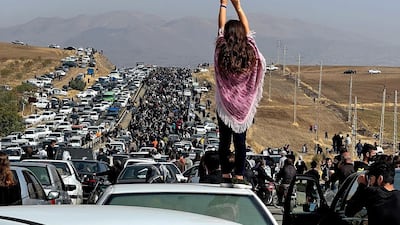Iranian activists on Monday issued a new year's “victory” message, as anti-government protests continued for a third month.
Leaders of exiled Iranian pro-opposition figures from the human rights, culture and sports sectors released a co-ordinated message calling 2023 the year of hope. The message is seen as an attempt to find a long-sought unity.
The anti-government protests triggered by the death of Iranian-Kurdish woman Mahsa Amini have united the diaspora, which has long been divided following the ousting of Shah Mohammad Reza Pahlavi in 1979.
“The year 2022 was a glorious year of solidarity for Iranians of every belief, language and orientation,” the statement said.
“With organisation and solidarity, 2023 will be the year of victory for the Iranian nation. The year of freedom and justice in Iran.”
The message was released simultaneously on social media by a variety of figures, ranging from the influential dissident Masih Alinejad to the son of the ousted shah, Reza Pahlavi.
Prominent actors Golshifteh Farahani and Nazanin Boniadi also tweeted the message, as did Zar Amir Ebrahimi, who won the Best Actress award at the Cannes Film Festival in France last year.
“We are united to reach freedom,” Farahani wrote on Instagram.
“We will stand together and will not be silent”.
Prominent rights activists who posted the message included Nobel Peace Prize laureate Shirin Ebadi, and Hamed Esmaeilion, who has led the Canada-based campaign for justice for the victims of the Ukraine Airlines flight shot down by Iran in January 2020.
The group was joined by former Iranian international footballer Ali Karimi, who has been a vociferous supporter of the protest movement.
The protest movement has presented the clerical leadership with its biggest challenge since the 1979 revolution.
The crackdown has caused the deaths of 476 people, according to Norway-based Iran Human Rights.
Two people have already been executed over their participation in the protests, while Iran Human Rights says at least 100 detainees are at risk of execution.
The UN says that at least 14,000 people have been arrested, with several well-known figures such as the actor Taraneh Alidoosti still in detention.
On Monday, the family of Iranian activist and journalist Keyvan Samimi said he is still in detention, denying earlier press reports that he had been freed.
The day before, the reformist daily Shargh reported the release of the 73-year-old, sentenced to three years in prison in December 2020 for “conspiracy against national security”.
His family said, however, that Samimi was still serving his sentence in prison in Semnan, more than 200km east of the capital Tehran.
The journalist was authorised in February 2022 to return home due to health problems but was sent back to prison in May after being accused of carrying out activities against national security, Mehr news agency reported at the time.
Increased dress code scrutiny
Iranian police on Monday warned that women must wear headscarves even in cars.
Fars news agency quoted a senior police officer who said the “new stage” of the Nazer-1 programme, known as the “surveillance” in Farsi, was being rolled out “across the country by the police” in an effort to crack down on breaches of the country's strict dress code.
When it was launched in 2020, car owners would be sent a text message alerting them of a breach of the dress code in their vehicle and warning of “legal” action if repeated.
But police have appeared to drop the threat of legal action, according to messages posted on social media platforms.
“The removal of hijab has been observed in your vehicle. It is necessary to respect the norms of the society and make sure this action is not repeated,” read a message reportedly sent by police and posted on social media.
Death of Qassem Suleimani
The ongoing protests came as Iran marked on Monday the third anniversary of the assassination of Maj Gen Qassem Suleimani, who was killed in a US drone strike in Baghdad alongside Iraqi militia leader Abu Mahdi Al Muhandis.
Iran's foreign ministry said the killing by Washington is a “glaring example of an organised terrorist act”.
The ministry said that the US must bear “definite international responsibility” for this crime, noting that all those involved must also be held to account.
Iran's Foreign Minister Hossein Amirabdollahian on Sunday said that about 60 American officials have been blacklisted by Tehran for their involvement in the killing.
In a televised interview before the third anniversary of the death of the former commander of the Islamic Revolutionary Guards Corps Quds Force, Mr Amirabdollahian said Iran is still investigating the assassination.



















